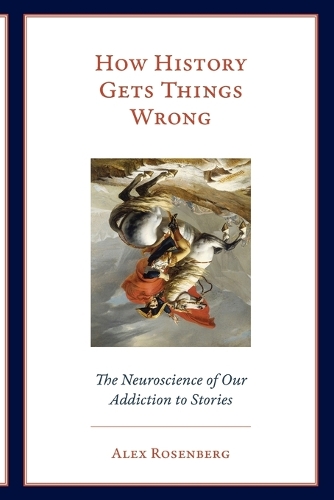
How History Gets Things Wrong: The Neuroscience of Our Addiction to Stories
(Paperback)
Publishing Details
How History Gets Things Wrong: The Neuroscience of Our Addiction to Stories
By (Author) Alex Rosenberg
MIT Press Ltd
MIT Press
13th August 2019
United States
Classifications
General
Non Fiction
History: theory and methods
Neurosciences
150
Physical Properties
Paperback
296
Width 152mm, Height 229mm, Spine 19mm
Description
Why we learn the wrong things from narrative history, and how our love for stories is hard-wired.To understand something, you need to know its history. Right Wrong, says Alex Rosenberg in How History Gets Things Wrong. Feeling especially well-informed after reading a book of popular history on the best-seller list Don't. Narrative history is always, always wrong. It's not just incomplete or inaccurate but deeply wrong, as wrong as Ptolemaic astronomy. We no longer believe that the earth is the center of the universe. Why do we still believe in historical narrative Our attachment to history as a vehicle for understanding has a long Darwinian pedigree and a genetic basis. Our love of stories is hard-wired. Neuroscience reveals that human evolution shaped a tool useful for survival into a defective theory of human nature. Stories historians tell, Rosenberg continues, are not only wrong but harmful. Israel and Palestine, for example, have dueling narratives of dispossession that prevent one side from compromising with the other. Henry Kissinger applied lessons drawn from the Congress of Vienna to American foreign policy with disastrous results. Human evolution improved primate mind reading-the ability to anticipate the behavior of others, whether predators, prey, or cooperators-to get us to the top of the African food chain. Now, however, this hard-wired capacity makes us think we can understand history-what the Kaiser was thinking in 1914, why Hitler declared war on the United States-by uncovering the narratives of what happened and why. In fact, Rosenberg argues, we will only understand history if we don't make it into a story.
Reviews
His patient frustration at humanity's persistent wrong-headedness nicely seasons well-judged chapters that carefully guide the non-scientist through a history there is no other word for it of 20th-century neurological discoveries that prove his point.
TIMES HIGHER EDUCATIONRosenberg has written a fascinating and challenging book, one that every historian should read and take into account.
ChoiceAlex Rosenberg, a professor of philosophy at Duke University, has written a thought provoking and intellectually unsettling book.
Social Epistemology Review and Reply CollectiveRosenberg's thought-provoking book is to be praised for persuasively articulating the challenge of making sense of our cognitive practices once we have given up the idea of original representational contents.
Notre Dame Philosophical ReviewsAuthor Bio
Alex Rosenberg is R. Taylor Cole Professor of Philosophy at Duke University. He is the author of The Atheist's Guide to Reality- Enjoying Life without Illusions and other books.
